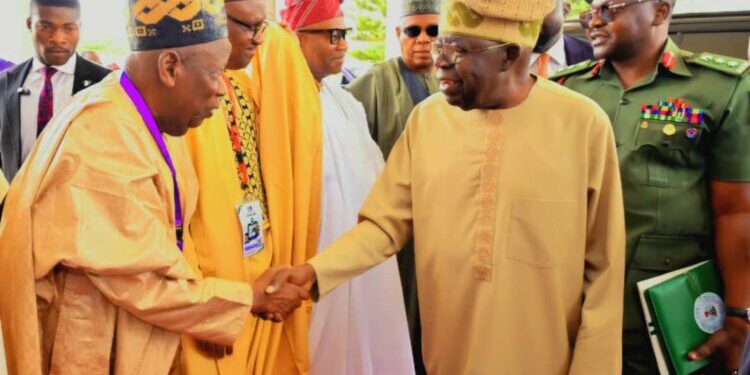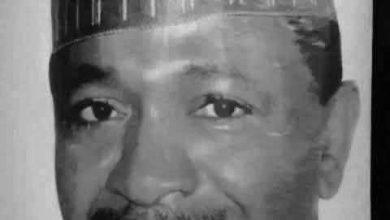
In the unfolding narrative of Nigeria’s political evolution, the ongoing realignment of political forces marked by a wave of defections into the ruling All Progressives Congress (APC) has sparked national debate. While some critics see the development as a drift toward one-party dominance, political observers in Kano and beyond argue otherwise, pointing to the reformist agenda of the APC and the stabilizing influence of its current leadership.
At the center of this transformation is Dr. Abdullahi Umar Ganduje, the National Chairman of the APC and a seasoned political strategist. Since his assumption of the party’s top position, Ganduje has played a critical role in strengthening the APC’s internal cohesion and projecting its renewed national vision one that aligns seamlessly with President Bola Ahmed Tinubu’s Renewed Hope Agenda.
Ganduje’s political instincts, honed through decades of public service and leadership in Kano State, have become instrumental in steering the party through turbulent waters. His emergence as National Chairman came at a time when the APC needed not just administrative leadership, but a unifying figure capable of reconciling factions, revitalizing party structures across the country, and preparing the ruling party for the challenges of governance and national expectations.
Related:
After Gombe Incident, Ganduje Reasserts Call for Political Decorum
Under his stewardship, the APC has transformed into a more ideologically grounded and strategically aligned force. The party’s outreach has expanded, and its policy communication has improved significantly, helping citizens better understand the often difficult, yet necessary reforms being implemented by the federal government.
Political consultants and media observers, such as Umar Idris Shuaibu, a Kano-based APC stalwart, have publicly attributed the growing popularity of the APC to both Tinubu’s reformist policies and Ganduje’s unifying leadership. The recent surge in defections from opposition parties is widely seen not as a symptom of democratic decline, but as a response to the visible impact of the administration’s efforts to reposition the economy, rebuild public institutions, and restore confidence in governance.
Ganduje’s approach to leadership has been pragmatic. He has worked to ensure party harmony, maintain political discipline, and deepen the APC’s engagement with youth, women, and grassroots movements. His national tour of reconciliation and dialogue has significantly reduced intra-party conflicts, while his quiet but firm influence in Abuja has helped streamline legislative-executive collaboration.
Meanwhile, President Tinubu’s recent address during the June 12 commemoration further underscored his commitment to democratic pluralism. Contrary to fears of creeping authoritarianism, Tinubu reaffirmed his belief in multi-party democracy and the rights of opposition parties to organize, campaign, and critique. As Shuaibu noted in several public commentaries, “the APC is not coercing anyone people are simply seeing progress and aligning with it.”
Indeed, Nigeria’s Independent National Electoral Commission (INEC) remains free to register new parties, and prominent opposition parties such as the Labour Party (LP) and the People’s Democratic Party (PDP) continue to operate actively, disproving notions of a closing political space.
Read Also:
Things to Know About Dr. Asiya Ganduje, Director of Community and Rural Development NWDC
The cooperation between the executive and the legislature, often criticized by some as excessive, is in fact a vital element of this administration’s strategy for fast-tracking reforms. Ganduje, with his strong legislative relationships and understanding of governance mechanics, has quietly supported this synergy, ensuring that party policies are translated into actionable government programs.
More broadly, the APC under Ganduje’s chairmanship has worked to preserve the democratic values Nigerians have fought for since 1999. The party leadership continues to champion civil liberties, uphold freedom of speech, and encourage public participation, hallmarks of a functioning democracy.
While tough economic decisions such as subsidy removals and currency reforms have drawn criticism, APC loyalists argue they are necessary corrections long overdue. Ganduje himself has been vocal in support of these decisions, urging Nigerians to see beyond temporary discomforts and focus on the long-term gains.
In his dual role as party leader and elder statesman, Ganduje embodies the kind of strategic calm and political wisdom the APC needs to consolidate its gains and ensure that Nigeria remains on a path of democratic deepening, national unity, and inclusive governance.
As the nation continues to debate the future of its democracy, one thing appears certain: the combined leadership of President Tinubu and Dr. Abdullahi Umar Ganduje is reshaping the political landscape not by suppression, but through reforms, strategy, and renewed public trust.



